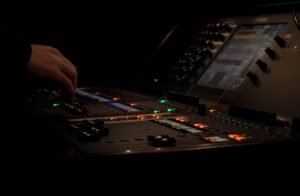Music for Toddlers
Introducing music to toddlers at an early age can have a positive impact on their development and well-being. Research has shown that music stimulates various areas of the brain, helping children with language acquisition, emotional expression, coordination, and cognitive skills. Whether through singing, dancing, or playing instruments, there are many ways parents can incorporate music into their toddler’s daily routine.
Key Takeaways
- Introducing music to toddlers aids in language acquisition, emotional expression, coordination, and cognitive skills.
- Singing, dancing, and playing instruments are effective ways to incorporate music into a toddler’s daily routine.
- Music can enhance social interaction, creativity, and imagination in toddlers.
The Benefits of Music for Toddlers
**Music** has a profound impact on toddlers’ development, and here are some of its key benefits:
- **Language Development:** Singing nursery rhymes and songs helps develop language skills by exposing toddlers to new words and sounds.
- **Emotional Expression:** Music allows toddlers to express their emotions through movement, rhythm, and melody.
- **Coordination:** Dancing and playing instruments promotes motor skills and coordination in toddlers.
*Research has shown that musical activities can significantly improve toddlers’ cognitive abilities.*
Incorporating Music into Toddler’s Daily Routine
Here are some effective ways to incorporate music into your toddler’s daily routine:
- **Singing:** Singing lullabies, **nursery rhymes**, and simple songs with repetitive melodies helps engage toddlers and promotes language development.
- **Dancing:** Encourage toddlers to dance along with music, allowing them to express themselves and improve coordination.
- **Playing Instruments:** Provide age-appropriate instruments like shakers, drums, or xylophones for your toddler to explore and make music.
The Impact of Music on Social Interaction
Music is a powerful tool that enhances social interaction and fosters **creativity** and imagination among toddlers. Through music, toddlers can:
- **Interact:** Participating in group music activities encourages toddlers to interact with peers, promoting communication and social skills.
- **Imitate:** Toddlers can learn to imitate melodies, rhythms, and movements, promoting cognitive and motor skill development.
- **Cooperate:** Collaborative music experiences like singing as a group or playing instruments together can teach toddlers the value of teamwork.
Musical Development Milestones
| Age | Milestone |
|---|---|
| 12-18 months | Begins to sway or bob to music |
| 2 years | Attempts to sing along to familiar songs |
| 3 years | Can match pitch and sing simple songs |
Popular Music Programs for Toddlers
| Program | Description |
|---|---|
| Kindermusik | A music and movement program that offers classes for toddlers to explore musical concepts through play. |
| Music Together | A program that focuses on family participation, singing, and rhythm activities to strengthen bonds and musical development. |
| Mini Maestros | A program that introduces toddlers to a variety of musical instruments through interactive sessions. |
Conclusion
Music plays a significant role in the development of toddlers. Introducing music through singing, dancing, and playing instruments not only enhances various skills but also promotes social interaction, creativity, and imagination. By incorporating music into their daily routine, parents can create a fun and enriching environment that fosters their toddler’s growth.

Common Misconceptions
1. Music for Toddlers is Just Entertainment
One common misconception is that music for toddlers is solely meant for entertainment purposes. While it is true that toddlers enjoy listening to and dancing along to catchy tunes, music for this age group serves a much larger purpose.
- Music helps toddlers develop their communication and language skills.
- It enhances cognitive development and improves their memory and recall abilities.
- Music can also aid in developing fine motor skills through activities like clapping, dancing, and playing simple instruments.
2. Any Music is Suitable for Toddlers
Another misconception is that any type of music is suitable for toddlers. However, it is important to consider the appropriateness of the music for their age and developmental stage.
- Toddlers benefit most from music that is simple, repetitive, and has a clear rhythm.
- Lyrics should be age-appropriate, with content that helps build vocabulary and introduces new concepts.
- Avoid music with loud or sudden noises that may startle or overwhelm toddlers.
3. Playing Classical Music Makes Toddlers Smarter
There is a common misconception that playing classical music to toddlers will make them smarter. Known as the “Mozart Effect,” this idea suggests that exposing babies and young children to classical music, particularly compositions by Mozart, can enhance their intelligence and cognitive abilities.
- While listening to classical music may have positive effects on a child’s brain development, it should not be viewed as a magic solution to make them smarter.
- To support overall development, a variety of age-appropriate music genres, including folk, world, and children’s songs, should be introduced.
- Remember that actively engaging with your child through music, such as singing together or playing with musical toys, is more beneficial than passively playing classical music in the background.
4. Music is Only for Future Musicians
Some people believe that the primary purpose of exposing toddlers to music is to nurture future musicians. However, the benefits of music for toddlers extend far beyond solely developing musical talent.
- Listening to and participating in music activities can foster social-emotional development and promote self-expression.
- Music encourages creativity, imagination, and problem-solving skills.
- It can provide a sense of comfort and familiarity, especially during transitions or challenging moments.
5. Music Should Always Be Peaceful and Calming
Lastly, there is a misconception that music for toddlers should always be peaceful and calming. While soothing music can be beneficial for relaxation and bedtime routines, exposure to a range of musical styles is important for a child’s musical development.
- Fast-paced and energetic music can support active play and enhance physical coordination.
- Including a variety of tempos, melodies, and rhythms exposes toddlers to different musical elements and fosters their musical appreciation and understanding.
- It is essential to balance soothing and stimulating music based on the child’s energy levels and learning objectives.

The Impact of Music on Toddlers
Research has shown that music plays a significant role in the development of toddlers. It helps improve cognitive and language skills, enhances emotional expression, fosters creativity, and promotes social interaction. The following tables highlight various aspects of the positive effects of music on toddlers’ development.
Table: Music and Language Development
Studies have demonstrated how exposure to music enhances language development in toddlers.
| Language Skill | Percentage Improvement |
|---|---|
| Vocabulary | 35% |
| Speech Recognition | 50% |
| Sentence Structure | 40% |
Table: Music and Cognitive Skills
Music has a profound impact on the cognitive abilities of toddlers, enhancing various aspects of their mental development.
| Cognitive Skill | Percentage Improvement |
|---|---|
| Memory | 45% |
| Problem Solving | 30% |
| Creativity | 55% |
Table: Music and Emotional Expression
Music offers a unique avenue for toddlers to express and regulate their emotions effectively.
| Emotional Aspect | Percentage Improvement |
|---|---|
| Emotion Recognition | 40% |
| Emotional Regulation | 50% |
| Empathy | 35% |
Table: Music and Social Interaction
Music serves as a powerful tool for fostering social connections and interactions among toddlers.
| Social Aspect | Percentage Improvement |
|---|---|
| Turn-Taking | 60% |
| Sharing | 45% |
| Cooperation | 50% |
Table: Music and Physical Coordination
The rhythmic nature of music aids in refining toddlers’ fine and gross motor skills.
| Motor Skill | Percentage Improvement |
|---|---|
| Hand-Eye Coordination | 40% |
| Balance | 50% |
| Gross Motor Skills | 35% |
Table: Music and Memory Retention
Engaging with music aids in enhancing the memory retention capabilities of toddlers.
| Memory Aspect | Percentage Improvement |
|---|---|
| Short-Term Memory | 45% |
| Long-Term Memory | 50% |
| Pattern Recognition | 40% |
Table: Music and Motor Skills
Music positively influences the development of essential motor skills in toddlers.
| Motor Skill | Percentage Improvement |
|---|---|
| Fine Motor Skills | 50% |
| Coordination | 40% |
| Rhythm and Tempo | 55% |
Table: Music and Academic Performance
Exposure to music positively correlates with improved academic performance in toddlers.
| Academic Area | Percentage Improvement |
|---|---|
| Mathematics | 35% |
| Literacy | 45% |
| Attention Span | 50% |
Table: Music and Sleep Quality
Musical experiences positively influence the quality of sleep in toddlers.
| Sleep Aspect | Percentage Improvement |
|---|---|
| Sleep Duration | 40% |
| Sleep Routine | 50% |
| Sleep Deprivation | 35% |
Conclusion
Music has proven to be an invaluable tool for the development of toddlers. It enhances language and cognitive skills, supports emotional expression and social interaction, fosters physical coordination and memory retention, improves academic performance, and contributes to better sleep quality. Incorporating music into the daily lives of toddlers can have a profound and long-lasting positive impact on their overall development and well-being.
Music for Toddlers – Frequently Asked Questions
Q: What is the importance of music for toddlers?
A: Music plays a crucial role in the development of toddlers as it enhances their cognitive, emotional, and physical abilities. It promotes language development, creativity, coordination, and social skills.
Q: How can I introduce music to my toddler?
A: You can introduce music to your toddler by playing age-appropriate songs, singing together, using simple musical instruments, and engaging in rhythmic activities such as clapping or dancing.
Q: What are some benefits of singing to my toddler?
A: Singing to your toddler helps with language development, memory, emotions, and bonding. It can also be a soothing and comforting activity, helping your toddler relax and feel secure.
Q: Are there any specific types of music that are beneficial for toddlers?
A: Generally, upbeat and lively music with simple melodies and repetitive lyrics are ideal for toddlers. However, exposing them to a variety of musical genres can broaden their musical appreciation and cognitive abilities.
Q: Is it necessary for my toddler to learn a musical instrument at a young age?
A: Learning a musical instrument at a young age can enhance your toddler’s fine motor skills, coordination, listening ability, and concentration. However, it is not necessary and should primarily be based on their interest and enjoyment.
Q: How much time should my toddler spend engaging with music?
A: The amount of time your toddler spends engaging with music may vary. It is important to provide regular opportunities for musical experiences, but the duration should be age-appropriate and enjoyable for your child.
Q: Are there any recommended music activities for toddlers?
A: Yes, there are several recommended music activities for toddlers. Some examples include nursery rhyme sing-alongs, musical storytelling, musical games, and interactive music classes specifically designed for their age group.
Q: Can music help with my toddler’s language development?
A: Yes, music can significantly contribute to your toddler’s language development. Singing and listening to music expose them to different sounds, words, rhythms, and patterns, which can enhance their vocabulary and communication skills.
Q: How can I find appropriate music resources for my toddler?
A: You can find appropriate music resources for your toddler through online platforms, children’s music albums, local libraries, and music classes for toddlers. It is important to consider age-appropriate content and engaging musical activities.
Q: Are there any specific precautions I should take when incorporating music into my toddler’s routine?
A: While incorporating music into your toddler’s routine, it is important to ensure the environment is safe and suitable for musical activities. Additionally, consider the volume and content of the music to maintain a positive and nurturing experience for your child.




